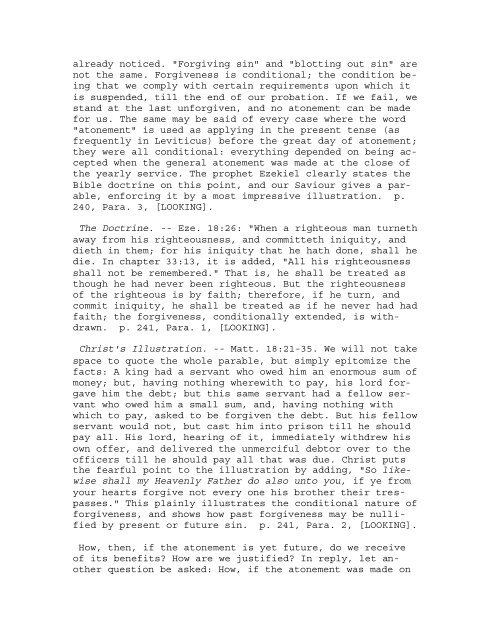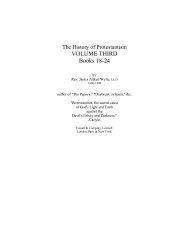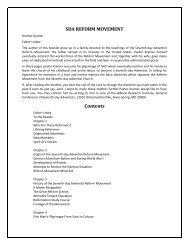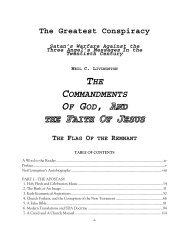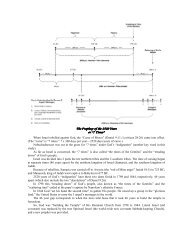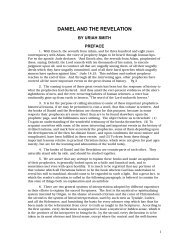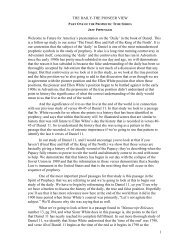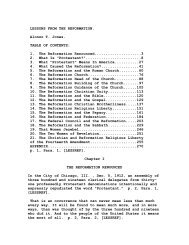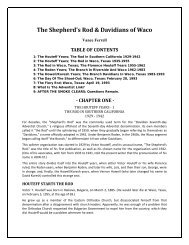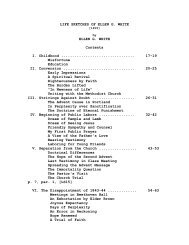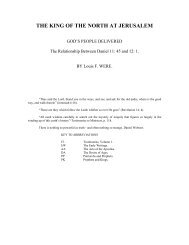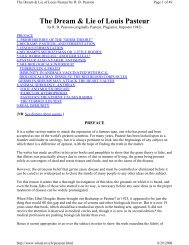LOOKING UNTO JESUS OR CHRIST IN TYPE AND ANTITYPE. BY ...
LOOKING UNTO JESUS OR CHRIST IN TYPE AND ANTITYPE. BY ...
LOOKING UNTO JESUS OR CHRIST IN TYPE AND ANTITYPE. BY ...
You also want an ePaper? Increase the reach of your titles
YUMPU automatically turns print PDFs into web optimized ePapers that Google loves.
already noticed. "Forgiving sin" and "blotting out sin" are<br />
not the same. Forgiveness is conditional; the condition being<br />
that we comply with certain requirements upon which it<br />
is suspended, till the end of our probation. If we fail, we<br />
stand at the last unforgiven, and no atonement can be made<br />
for us. The same may be said of every case where the word<br />
"atonement" is used as applying in the present tense (as<br />
frequently in Leviticus) before the great day of atonement;<br />
they were all conditional: everything depended on being accepted<br />
when the general atonement was made at the close of<br />
the yearly service. The prophet Ezekiel clearly states the<br />
Bible doctrine on this point, and our Saviour gives a parable,<br />
enforcing it by a most impressive illustration. p.<br />
240, Para. 3, [<strong>LOOK<strong>IN</strong>G</strong>].<br />
The Doctrine. -- Eze. 18:26: "When a righteous man turneth<br />
away from his righteousness, and committeth iniquity, and<br />
dieth in them; for his iniquity that he hath done, shall he<br />
die. In chapter 33:13, it is added, "All his righteousness<br />
shall not be remembered." That is, he shall be treated as<br />
though he had never been righteous. But the righteousness<br />
of the righteous is by faith; therefore, if he turn, and<br />
commit iniquity, he shall be treated as if he never had had<br />
faith; the forgiveness, conditionally extended, is withdrawn.<br />
p. 241, Para. 1, [<strong>LOOK<strong>IN</strong>G</strong>].<br />
Christ's Illustration. -- Matt. 18:21-35. We will not take<br />
space to quote the whole parable, but simply epitomize the<br />
facts: A king had a servant who owed him an enormous sum of<br />
money; but, having nothing wherewith to pay, his lord forgave<br />
him the debt; but this same servant had a fellow servant<br />
who owed him a small sum, and, having nothing with<br />
which to pay, asked to be forgiven the debt. But his fellow<br />
servant would not, but cast him into prison till he should<br />
pay all. His lord, hearing of it, immediately withdrew his<br />
own offer, and delivered the unmerciful debtor over to the<br />
officers till he should pay all that was due. Christ puts<br />
the fearful point to the illustration by adding, "So likewise<br />
shall my Heavenly Father do also unto you, if ye from<br />
your hearts forgive not every one his brother their trespasses."<br />
This plainly illustrates the conditional nature of<br />
forgiveness, and shows how past forgiveness may be nullified<br />
by present or future sin. p. 241, Para. 2, [<strong>LOOK<strong>IN</strong>G</strong>].<br />
How, then, if the atonement is yet future, do we receive<br />
of its benefits? How are we justified? In reply, let another<br />
question be asked: How, if the atonement was made on


